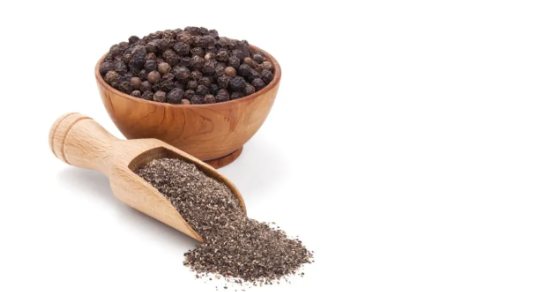Welcome to our exploration of one of the most treasured spices in the culinary world: black pepper! Known as the “king of spices,” black pepper (Piper nigrum) has been an essential ingredient in kitchens and medicine cabinets for thousands of years. Its robust flavor and aromatic qualities make it a staple in cuisines around the globe, while its impressive health benefits have earned it a prominent place in traditional medicine.

Join us as we delve into the fascinating history of black pepper, uncover its myriad health benefits as highlighted in Dr. Bharat Aggarwal’s Healing Spices, and discover how to incorporate this extraordinary spice into your daily cooking.
Historical Significance of Black Pepper
Black pepper has a rich history that dates back over 4,000 years. Native to the tropical regions of India, it was highly valued in ancient trade routes, often referred to as “black gold.” It played a significant role in international commerce, influencing trade relationships between Europe and Asia. In ancient times, black pepper was even used as currency, a testament to its value.
Throughout history, black pepper has been celebrated not only for its flavor but also for its medicinal properties. It was a popular remedy in ancient Indian Ayurvedic medicine, as well as in traditional Chinese medicine. Its status as a highly sought-after spice contributed to the age of exploration, as European powers sought new trade routes to access this precious commodity.
Culinary Uses of Black Pepper
Black pepper is incredibly versatile and can be used in a variety of culinary applications. Here are some popular ways to incorporate black pepper into your cooking:
- Seasoning: A dash of freshly ground black pepper enhances the flavor of virtually any dish, from meats and vegetables to soups and sauces.
- Marinades: Combine black pepper with olive oil, vinegar, and herbs to create flavorful marinades for meats and fish.
- Spice Blends: Black pepper is a key ingredient in many spice blends, including curry powders, barbecue rubs, and garam masala.
- Condiment: Use black pepper in salad dressings or as a finishing touch on roasted vegetables to add depth and warmth.
- Baking: Surprisingly, black pepper can also be used in baked goods, like pepper biscuits or spiced cakes, to provide a unique flavor profile.
Health Benefits of Black Pepper
According to Dr. Bharat Aggarwal in Healing Spices, black pepper is not only a culinary favorite but also a powerhouse of health benefits. Here are some key advantages backed by scientific research:
- Rich in Antioxidants:
Black pepper contains piperine, an active compound known for its antioxidant properties. Antioxidants help combat oxidative stress and may reduce the risk of chronic diseases, including heart disease and cancer.
- Reference: Aggarwal, B. B., & Harikumar, K. B. (2009). “Potential of piperine in the prevention of cancer.” Journal of Alternative and Complementary Medicine.
- Digestive Health:
Black pepper stimulates the production of digestive enzymes, which can improve digestion and alleviate gastrointestinal issues. It has been traditionally used to treat indigestion and bloating.
- Reference: Rao, S. D., et al. (2013). “Piperine: A review of its effects on human health.” International Journal of Pharmaceutical Sciences and Research.
- Anti-Inflammatory Effects:
Piperine has anti-inflammatory properties that may help reduce inflammation in the body. This can be beneficial for conditions such as arthritis and other inflammatory diseases.
- Reference: Aggarwal, B. B., & Sung, B. (2009). “The anti-inflammatory and anti-cancer effects of piperine.” Journal of Ethnopharmacology.
- Enhanced Nutrient Absorption:
One of the remarkable benefits of black pepper is its ability to enhance the bioavailability of certain nutrients. For instance, it can increase the absorption of curcumin (found in turmeric) and other beneficial compounds.
- Reference: Shoba, G., et al. (1998). “Influence of piperine on the pharmacokinetics of curcumin in animals and human volunteers.” Planta Medica.
- Respiratory Health:
Black pepper is known for its expectorant properties, making it beneficial for respiratory health. It can help alleviate congestion and improve overall respiratory function.
- Reference: Kaur, T., et al. (2015). “Pharmacological properties of black pepper and its medicinal use.” Journal of Pharmacy Research.
Conclusion: Embrace the Power of Black Pepper
As we conclude our exploration of black pepper, it’s clear that this remarkable spice holds a special place in both culinary and medicinal traditions. From its rich historical significance as a valuable trade commodity to its numerous health benefits supported by scientific research, black pepper is truly the “king of spices.”
Incorporating black pepper into your daily diet not only enhances the flavor of your meals but also contributes to your overall health. Whether sprinkled on roasted vegetables, blended into marinades, or enjoyed in a warm bowl of soup, black pepper is a versatile ingredient that deserves a prominent spot in your kitchen.
So, embrace the power of black pepper and let its bold flavor and health benefits inspire your culinary adventures!
